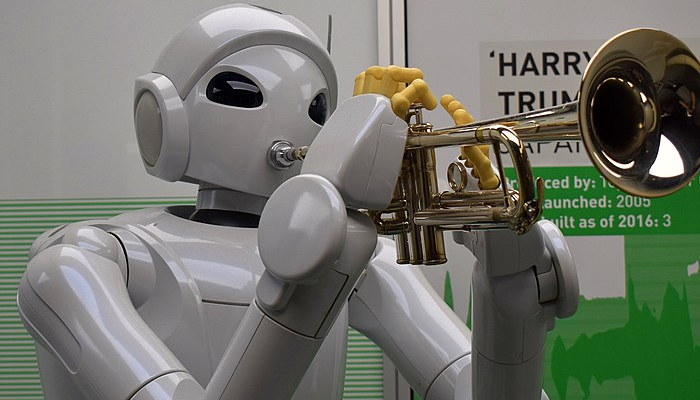Artificial intelligence (AI)
Where can I find information about artificial intelligence (AI) and how it works?
(Years 7-10)

Image: Artificial Intelligence & AI & Machine Learning - 30212411048.jpg by https://www.vpnsrus.com/ on Wikimedia Commons.
Entry last updated: 4/02/25
Introduction
Artificial Intelligence or AI is an area of computer science that concerns machines making intelligent responses and thinking and reacting like humans.
History of AI
The websites below cover the history of AI, including AI pioneers and major developments in Artificial Intelligence.
Britannica School Secondary is part of EPIC, a collection of databases covering lots of different topics. It has been put together especially for schools in Aotearoa New Zealand and helps to answer questions like this.
Enter the words 'artificial intelligence' into the search box.
Look through the results for History of artificial intelligence (AI).
The article mentions pioneers like Alan Turning, and early milestones.
For modern developments in AI, find the link to artificial intelligence in the Introduction.
Tips: To get to the EPIC resources you will need a password from your school librarian first. Or you can chat with one of our AnyQuestions librarians and they will help you online. Some EPIC databases may also be available through your public library.
IBM (International Business Machines Corporation)
IBM is an information technology company from the United States that produces and sells software, computer hardware, and offers consulting services.
Use the search box to enter 'History of artificial intelligence'.
Then find the link to The history of AI.
This article covers the history of major developments in AI from 1726.
Tips: Websites that have .com or .co in the address can have good information, but you need to assess how reliable it is. Check the About us link on the website, if you can find one. That can tell you what the company’s mission and values are.
How AI works
Many computers use a set of rules loosely based on the human brain, to interpret data, recognise patterns, perform logical equations and potentially even come up with new ideas based on this data.
Middle School (Gale in Context)
This is another site from EPIC. This database has articles, images, audio, biographies, and videos on various topics.
Go to Browse Topics from the bar at the top of the page.
The topics are in alphabetic order, so look for Artificial Intelligence.
You can also use the search box to enter the word 'ChatGPT'.
Select ChatGPT to understand what it is and how it works.
Tips: Search words, or keywords, are the most important words in our question. You can leave out small words like ‘the’ and ‘of’ and just choose the main ones, eg ChatGPT. We can always change our keywords or add more if we need to.
The British Broadcasting Corporation is a trusted media company and has lots of different channels on YouTube. The purpose of this channel is to explain new ideas through animated videos.
Find the search option for the channel beside the channel tabs.
Search for 'artificial intelligence'.
Watch 5 things you really need to know about AI | BBC Ideas.
Tips: You will find a huge selection of videos on YouTube. We recommend you view videos from reliable sources like National Geographic, History Channel, BBC etc.
This website has educational videos and articles on a range of topics, including science. To browse, use the search feature or select Courses at the top of the page.
Enter the search words 'Artificial Intelligence'
Select the video How AI Works.
Also, read the article What is artificial intelligence and how do social media companies use it? and watch What is machine learning?
Tips: Websites that have .org or .net in the address can have good information, but you need to assess how reliable it is. Check the About us link on the website, if you can find one. That can tell you what the organisation’s mission and values are.
This is one of the EPIC databases. Here you will find articles, pictures and news about artificial intelligence.
Enter the keywords 'AI', 'Artificial Intelligence', or 'generative artificial intelligence' into the search bar at the top of the page.
This will bring up a range of results eg Artificial Intelligence (AI) or ChatGPT.
Tips: Search words, or keywords, are the most important words in our question. Usually it’s better to leave out small words like ‘the’, ‘a’ and ‘of’ and just choose the main ones, eg Artificial Intelligence. We can always change our keywords or add more if we need to.
Ethics
Ethics are moral principles that guide what decision makers should do when creating and developing artificial intelligence. This can be for what is good for society or for individual people.
UNESCO - Artificial Intelligence
The aim of the United Nations Education, Scientific and Cultural Organization is to achieve lasting peace. It has information put together by experts about artificial intelligence.
Select the tab Ethics of AI.
This page has links to more detailed information about UNESCO's recommendations about the development of AI.
Or look further down the page to the headings for Four core values and A human rights approach to AI to find a quick look at the recommendations.
Revisit this site to find out about ethics and AI.
Search for 'artificial intelligence ethics'.
Watch the video Ethics and AI.
This video talks about the ethical considerations and privacy concerns around using AI in education.
Middle School (Gale in Context)
Revisit this EPIC database to find out about the impacts of artificial intelligence.
Find the Artificial Intelligence topic page from before.
Look for the Search within results feature.
Use keywords related to AI ethics.
For example 'unethical' found Responsible Use of Artificial Intelligence.
This article talks about responsible use for developers and users, as well as school policies.
Impacts
There are positive and negative impacts from AI including on the environment, climate change, education, the economy, society, and more. The following websites talk about these impacts and the benefits and disadvantages of AI.
This part of the public Britannica website has pro and con arguments and perspectives for lots of issues. It gives background information about the topic as well as a list of sources.
Go to the heading Digital Life, Science, & Technology.
Choose Artificial Intelligence.
From the Table of Contents select Pros and Cons at a Glance.
Continue reading the article for more information about the possible positive and negative impacts of AI.
RNZ is New Zealand's public radio broadcasting organisation with a programme mix of news, views, current affairs, documentaries, features, drama and music.
Use 'artificial intelligence' as your keywords or combine it with other keywords to find results.
We searched for 'artificial intelligence climate change' and found Data centres ride AI boom in world with finite renewable energy supplies.
A search for 'artificial intelligence business' found Kiwi software firm Lumin hits 100 million user milestone.
Te Ao - Māori News is part of Whakaata Māori. It is Aotearoa's leading Māori news provider. It is focused on delivering a more inclusive approach to Māori news and includes a te ao Māori perspective.
Search for 'artificial intelligence'.
Choose an article to read eg Experts explore using AI in classrooms across Aotearoa.
Is the growth of AI a threat to Māori? talks about Data Sovereignty.
Books
There are many books that have been written about this topic - check out your local public or school library to see what they have. Here are some recommended titles:
Medical artificial intelligence breakthroughs by Heather E. Schwartz.
What you need to know about AI: a beginner's guide to what our future holds by Professor Brian David Johnson.
Why AI? : all your questions about AI answered by a computer scientist by Dharini Balasubramaniam.
Android dreams: the past, present and future of artificial intelligence by Toby Walsh.
SCIS no: 1903581


